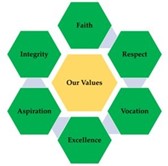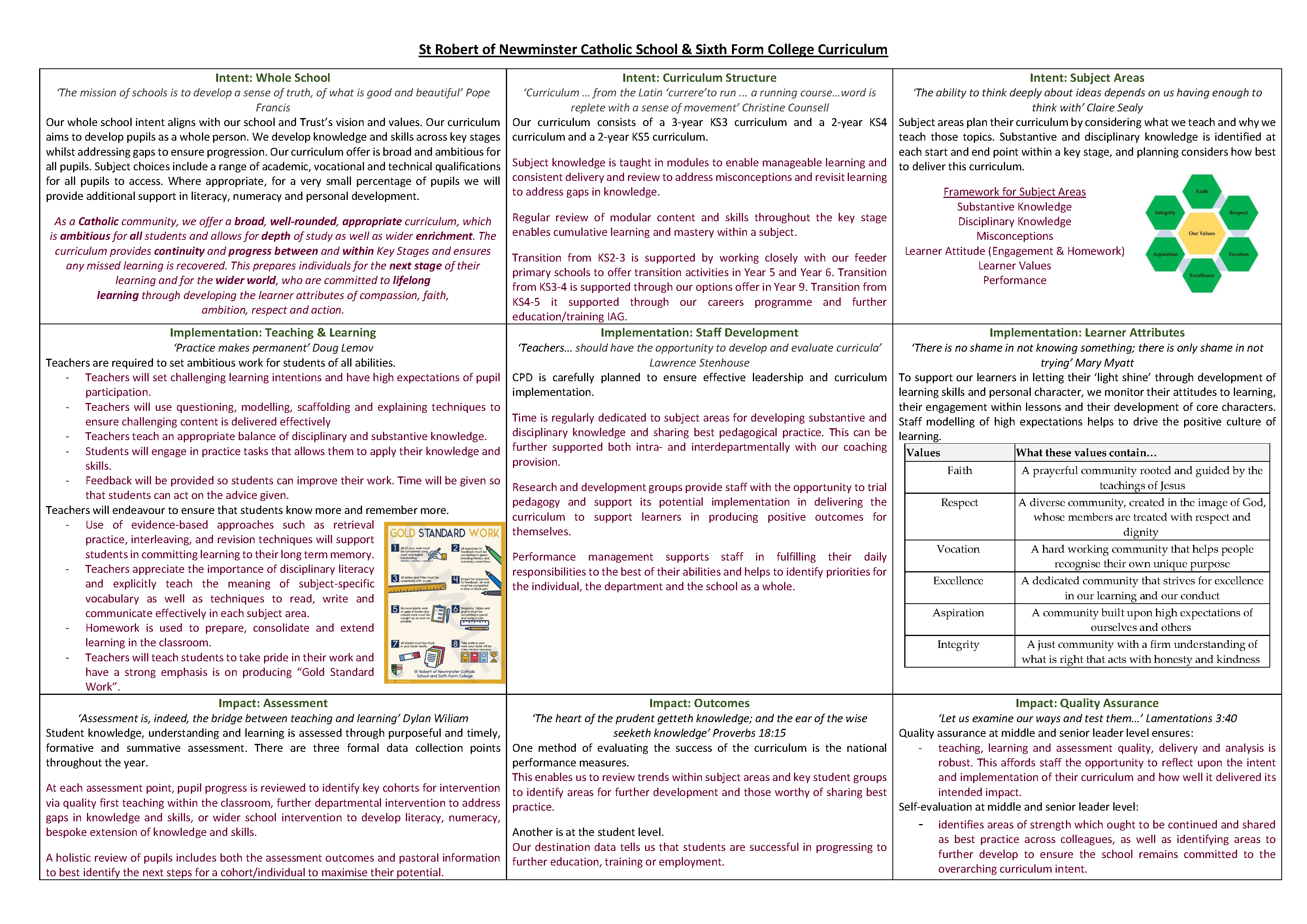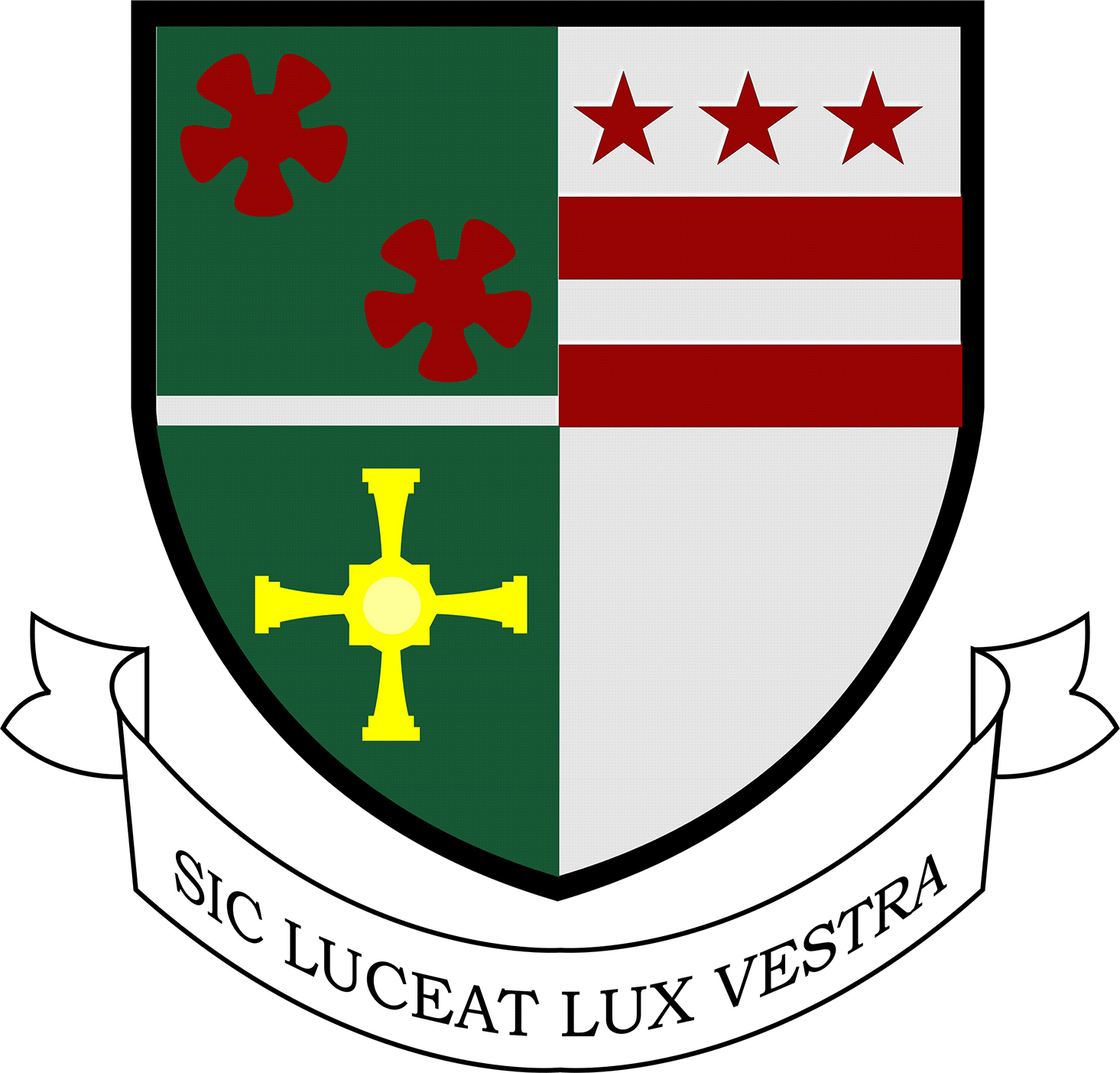Curriculum at St Robert of Newminster School and Sixth Form College is developed to identify the key knowledge and skills that students need in order to be successful within the school community and beyond. Staff ensure this is delivered in an engaging way and support progress of students using assessment information and planning intervention both within the classroom and via a whole school approach.

Intent
Our overarching whole school intent aligns with our school and Trust’s vision and values. Our curriculum aims to develop students as a whole person. We develop knowledge and skills across key stages whilst addressing gaps to ensure progression. Our curriculum offer is broad and ambitious for all students. Subject choices include a range of academic, vocational and technical qualifications for all students to access. Where appropriate, for a very small percentage of students we will provide additional support in literacy, numeracy and personal development.
As a Catholic community, we offer a broad, well-rounded, appropriate curriculum, which is ambitious for all students and allows for depth of study as well as wider enrichment. The curriculum provides continuity and progress between and within Key Stages and ensures any missed learning is recovered. This prepares individuals for the next stage of their learning and for the wider world, who are committed to lifelong learning through developing the learner attributes of compassion, faith, ambition, respect and action.
Subject specific curriculum intent identifies crucial learning (knowledge and skills) that is required at each end point i.e. end of academic year/end of key stage, is sequenced accordingly and delivered to enable progression whilst addressing common misconceptions.
Structure
A modular approach is central to the structure of our curriculum to enable manageable learning allowing for gradual security of learning to aid long term memory. A review of progress at the end of each module identifies key concepts or skills to be revisited and enables for reflection of student study skills in terms of engagement within lessons and homework activities.
Schemes of work are designed around the building blocks of key concepts, knowledge and skills and common misconceptions. Curriculum plans outline long term planning to identify start and end points within this learning overview and includes opportunities within schemes for retrieval practice, interleaved learning and opportunities to deepen understanding of particular concepts.
SEND
At St Robert of Newminster School and Sixth Form College, our intention for Special Educational Needs and/or Disabilities (SEND) is to ensure that all children receive a high-quality and ambitious education regardless of need or disability. We believe that it is vital that our students are equipped with the tools needed to become independent, inquisitive learners both in and out of the classroom.
Through our high-quality planning, teaching and provision we:
• Pride ourselves on early identification and intervention for SEND to ensure that progress and opportunities are maximized.
• Ensure that all children have access to a broad and balanced curriculum which is personalised to enable children to understand the relevance and purpose of learning.
• Provide an accessible learning environment which is tailored to the individual needs of all students.
• Develop children’s independence and life skills.
• Regularly monitor the progress of children with SEND, using a child-centered approach.
• Provide good quality and relevant training for all staff members supporting children with SEND.
• Work in partnership with parents and carers. Work closely with external agencies and other professionals to hone and develop our provision for children with SEND.
Implementation
Our curriculum delivery is centred around how we enable all students to know more, do more and remember more in relation to the end points identified within curriculum planning and therefore retrieval and interleaved learning opportunities are common features within the classroom. Staff are supported via CPD opportunities to implement the curriculum through effective modelling, scaffolding, explanations which are adapted as a result of effective assessment and questioning. Subject areas support students to be effective learners by promoting literacy and reading skills with exposure to and explicit teaching of relevant tier 2 and 3 vocabulary to supplement the broader whole school strategy within tutorial.
To ensure the progression of all students, our student conferences provide teaching staff with key strategies to assist them within lessons to best support students’ individual needs.
Staff have embedded blended and remote learning strategies into their daily practice to ensure provision and support for students through the use of our Teams platform.
Assessment and Reporting
In addition to the ongoing nature of formative assessment, we provide opportunity for three summative assessments to review progress in a timely fashion. Such opportunities enable leaders, teachers, students and parents alike, the opportunity to reflect upon how securely students have learned and understood the key concepts at that time of the academic year. At key stage 3, students and parents are provided feedback on whether or not the child is ‘developing’, ‘working at expected level’ or ‘working beyond expected level’ for this time of the year. This enables curriculum leaders to review and adapt their short term planning to account for any identified gaps to ensure progression to the end goal. At key stage 4 and 5, parents ands students are provided with an equivalent examination grade or course descriptor grade. At each assessment point, we collate information on students’ engagement and quality of work in lessons and through home learning to provide a rounded assessment of a student. This information is reviewed by curriculum leaders as well as pastoral leaders to identify any intervention cohorts.
SEND
At our school, every teacher is a teacher of SEND. As such, inclusion is a thread that runs through every area of the school enhanced by collaboration between senior leaders, teachers, support staff, external agencies, parents and most importantly, the child. At St Roberts, students with SEND will be included in all aspects of the school day. They will be provided with quality first teaching, tailored to their needs and their contributions valued and acknowledged.
At, St Robert’s students with SEND may:
• Have specific 1:1 or small group intervention to support their area of need.
• Each year group has a named LSA who supports students throughout their time here at St. Roberts.
• Take part in social and emotional support interventions.
• Have additional organisational, emotional and social support from our Learning support Assistants.
• Work alongside external agencies such as an Educational Psychologist, Speech and Language Therapist, Occupational Therapist, Behavioural Outreach Team to develop specific targets tailored to the students needs.
Impact
In order to assess whether or not our intended curriculum is being implemented effectively, we ensure regular quality assurance procedures. This includes reviewing quality of learning via lesson visits, work scrutiny and student voice at a curriculum leader level. At a whole school level, we quality assure key cohorts via case studies in which students are shadowed across a number of lessons to gain a detailed perspective of the quality of their teaching and learning experience. We also engage in detailed curriculum conversations with curriculum leaders to review subject intent, implementation and impact and triangulate this with lesson visits, student voice and work scrutiny. In addition to this, we also utilise external support through the MAT to provide an impartial view which contributes to our self-evaluation and improvement planning.
Our SEND students feel happy, safe and respected. Students demonstrate high levels of engagement in activities, developing their academic and social skills so that they are fully prepared for adult life. Students with SEND make good progress due to the use of resources and small group intervention which meets the needs of the students. On leaving, St Robert’s children with SEND have developed good independence and life skills.
Curriculum at STR Years 7-11
As a Catholic community, we offer a broad, well-rounded, appropriate curriculum, which is ambitious for all students and allows for depth of study as well as wider enrichment. The curriculum provides continuity and progress between and within Key Stages and ensure any missed learning is recovered. This prepares individuals for the next stage of their learning and for the wider world, who are committed to lifelong learning through developing the learner attributes of compassion, faith, ambition, respect and action.






